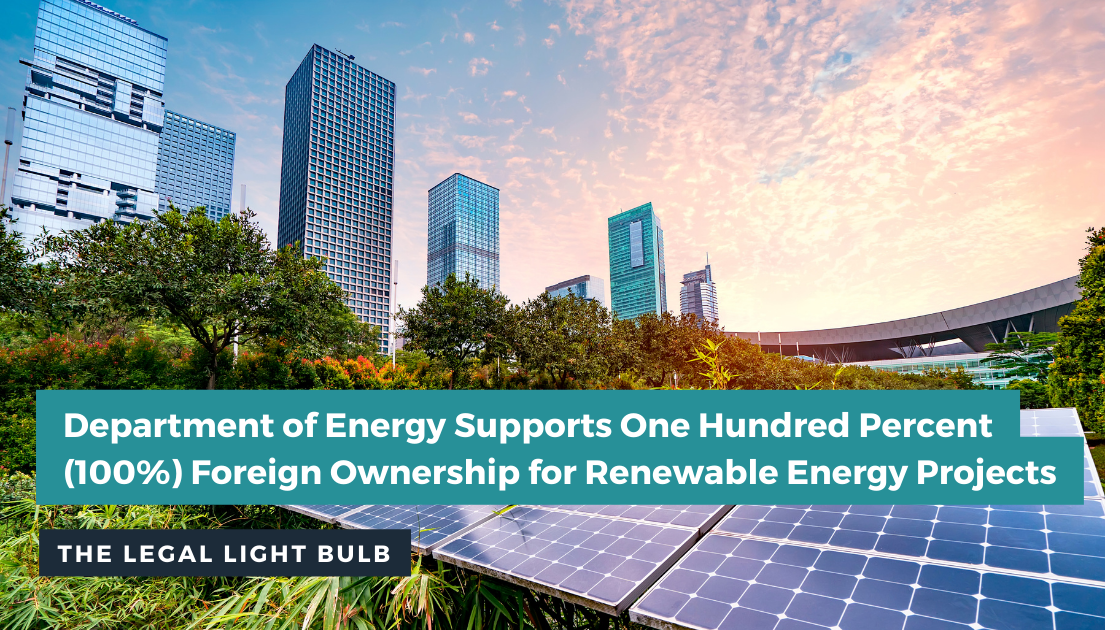By the year 2030, the Department of Energy (DOE) aims to attain a thirty-five percent (35%) share of renewable energy in the country’s energy mix. The DOE foresees this positive attainment by supporting one-hundred percent (100%) foreign ownership in renewable energy projects. This is pursuant to DOE’s Department Circular No. 2022-11-0034 which amended Section 19 of the Implementing Rules and Regulations (IRR) for Republic Act No. 9513, otherwise known as The Renewable Energy Act of 2008.[1] The Department Circular aims to accelerate the exploration and development of renewable energy resources by allowing 100% foreign ownership.
For an in-depth analysis and explanation of the country’s policy on one-hundred percent (100%) foreign ownership of renewable energy projects, it is best to consult an energy lawyer in the Philippines.
RENEWABLE ENERGY (RE) AND ITS IMPORTANCE
Unlike fossil fuels, sources of renewable energy are incapable of exhaustion under normal circumstances. Hence, their utilization is vital for preserving the Philippines’ natural resources and its fight against climate change.
The increase in the share of renewable energy also has significant economic implications. The DOE’s support in full foreign ownership of renewables is being promoted with policies that will attract more investments in offshore wind projects, solar, hydro, and ocean or tidal energy and other renewable energy projects.
Apart from attaining low carbon emissions, renewable energy projects can alleviate the shortage of electricity and lower its price. Along with this, foreign investors are encouraged to venture into renewable energy projects which would result in employment opportunities in provinces. Energy lawyers and law firms in the Philippines would agree that renewable energy projects provide great opportunities in certain localities.
THE IMMEDIATE EFFECT OF 100% FOREIGN OWNERSHIP IN RENEWABLE ENERGY
A surge of foreign investors was immediately experienced upon the relaxation of foreign equity restrictions in renewable energy projects. On 30 January 2023, in a meeting with Copenhagen Energy (a Danish renewable energy developer), their CEO Mr. Jasmin Bejdic expressed enthusiasm for investing in renewable energy projects in the Philippines. According to him, the Philippines is an up-and-coming business destination for floating wind towers.
As of January 2023, the Bureau of Investments (BOI) is evaluating eight renewable energy projects worth PHP446 billion. With the continuous increase of renewable energy projects, energy lawyers, company registration lawyers, and law firms in the Philippines will play a significant role.[2]
DOE: IN ATTAINING ITS TARGET FOR THE USE OF RENEWABLES
The National Renewable Energy Program (NREP) of the DOE was used as a guideline of the Renewable Energy Act of 2008. NREP has set transitional targets in attaining the transition of renewable energy from 2011-2030. The manual provides a new framework and roadmap that will further aid the DOE’s target for the use of renewables.
However, this promising project has encountered its challenges before. According to the DOE, “The NREP proceeds from the assumption that certain activities can be taken right away; while others will take time to implement. As a national program, it will require periodic review to ensure its conformity to the policy objectives set out in RA 9513.
Positive social and economic impacts cannot be overlooked. It is no wonder that the DOE supports the grant of full foreign ownership for renewable energy projects as potential foreign investments contribute to the attainment of the department’s target of thirty-five percent (35%) of renewable energy in the country’s energy mix by 2030.
Written By: Ruby Angela Ramos
[1] https://news.abs-cbn.com/business/02/03/23/doe-supports-full-foreign-ownership-for-renewable-energy-projects
[2] https://boi.gov.ph/php360-billion-offshore-wind-project-in-ilocos-norte-on-track-dti-chief/





